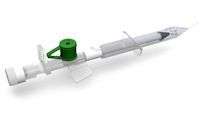University graduate unveils groundbreaking medical device

An inventor who has won numerous awards for his cutting edge designs has developed a product he believes could revolutionise hospital treatment.
Oliver Blackwell says his pain-free needle could be used in millions of procedures every year and lead to a more pleasant experience for patients.
He also says it will reduce the risk of contamination and improve efficiency for doctors and nurses working on the wards.
Mr. Blackwell, a Plymouth University graduate who is now based in Somerset, has been working on the design for around 18 months alongside two GPs and the former president of the Royal College of Anaesthetists.
He said: “Among some doctors, there seems to be a myth that needles don’t hurt. Most patients, however, will testify that they do and this is about making their time in hospital more comfortable.”
In appearance, the pain-free cannula is little different than the needles used on wards up and down the country every day. But attached on the front, there is a much smaller needle which administers around 0.2ml of local anaesthetic, to ease discomfort from the larger needle that follows.
Mr. Blackwell said: “We knew that doctors would not want an instrument that was hugely different to the ones they use now, hence we have kept it similar to an everyday cannula. But at the moment, if they want to use a local anaesthetic they have to use two needles, find keys and go to the medicine cupboard separately and it all takes time and effort.
“Our design cuts down that process but still ensures the patient’s comfort, meaning they have less pain and the doctor isn’t dealing with a traumatised patient. It also eradicates the risk of confusion or contamination because hospital staff will only have one needle instead of two.”
Mr Blackwell, 29, who graduated from Plymouth University in 2005, won the Daily Mail Designer of the Year Award in 2009 and was one of 10 people shortlisted for a British Airways Great Britons award in 2010. He has also worked on projects including the New Zealand Better By Design Programme and a product for the UK Security Services.
“People often ask how you can go from working on agricultural machinery one day to developing a medical instrument the next,” he said. “It is all about gaining an insight. You take simple information on board from the experts – in this case an anaesthetist and the GPs – and adapt your thinking based on their skills.
“Based on that, I have so far put thousands of hours into this project and we are now at the stage where we know the procedure and the technology work. We are now looking at the next stage of trials and testing before it can be put into mass production across the world and start making people’s lives more comfortable.”





















